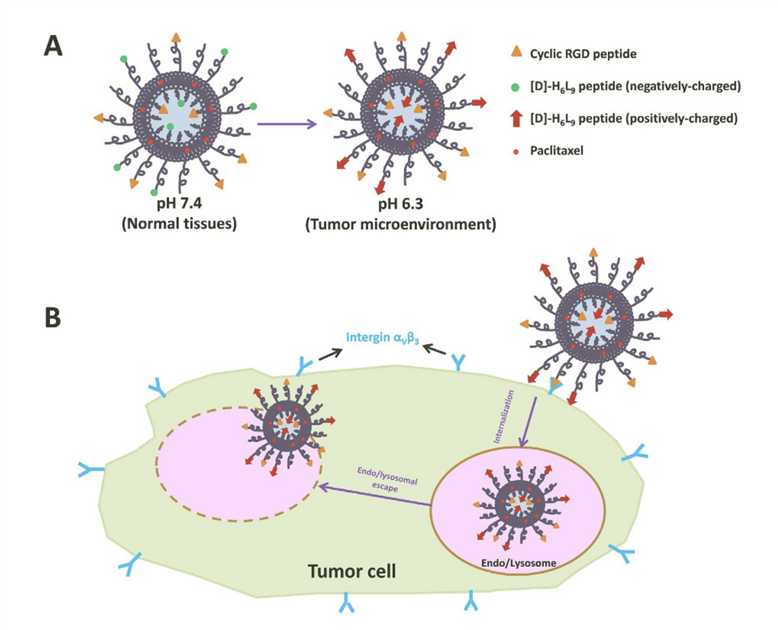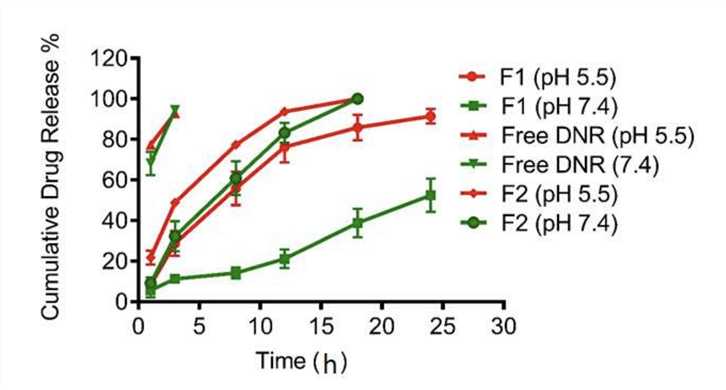Antibody-pH-Sensitive Liposome Production Service
Creative Biolabs is composed of highly skilled scientists with extensive experience in antibody engineering and bioconjugation techniques. We understand the intricacies of antibody selection, modification, and optimization, ensuring the efficacy of your antibody-pH-sensitive liposome conjugates.
Introduction
pH-sensitive liposomes are specialized lipid-based vesicles designed to release their contents in response to fluctuations in pH levels. Typically composed of phospholipids, these liposomes may also incorporate charged lipids or polymers that respond to acidity. Nowadays, liposomal coupling is extensively utilized in various biological experimental applications. For example, glycolipids integrated into the liposomal surface can selectively associate with antibody molecules through exogenous lectin bindings.
As a result, the specialized bioconjugation team at Creative Biolabs has developed antibody-pH-sensitive liposome production services that leverage pH-sensitive liposomes to create targeted antibody-liposome conjugates for detection and therapeutic applications. By employing specific techniques to attach fluorescent molecules to liposomes, we can convert them into bioactive agents suitable for detection or therapy. In a recent project, pH-sensitive liposomes further enhance the sensitivity of signal analytes used in precise detection or measurement within the immune system. Additionally, by modifying pH-sensitive liposomes to encapsulate fluorescent probes, we can significantly improve the sensitivity of antigen detection in tissue sections.
 Fig.1 The Structure of (R+D)-Lip And Its Surface Charge Variation Under Different pH.1,3
Fig.1 The Structure of (R+D)-Lip And Its Surface Charge Variation Under Different pH.1,3
Services
Creative Biolabs provides an extensive range of services focused on pH-sensitive liposomes, which includes the following capabilities:
- Formulation Development:
Design and formulation of pH-sensitive liposomes with tailored compositions.
Evaluation of lipid materials and encapsulation efficiency for various therapeutic agents.
- Characterization:
Characterization of size and charge using dynamic light scattering (DLS) and zeta potential measurements.
Evaluation of structural integrity employing techniques such as electron microscopy and various imaging methods.
- Pharmacokinetics and Biodistribution Studies:
In vivo studies to assess the distribution of liposome formulations in animal models.
Evaluation of pH-sensitive release effects on pharmacokinetics.
- Release Kinetics:
In vitro experiments to investigate drug release profiles at varying pH levels.
Simulations of physiological conditions to replicate tumor or inflamed tissue environments.
- Stability Testing:
Assessment of pH-sensitive liposome stability under various storage conditions.
Long-term stability studies to determine shelf life and formulation viability.
- Toxicology and Safety Assessment:
Conducting toxicity studies to evaluate the biocompatibility of liposome formulations.
Assessing the safety profile before entering clinical trials.
 Fig.2 Drug Release Analysis of DNR Encapsulated Liposome.2,3
Fig.2 Drug Release Analysis of DNR Encapsulated Liposome.2,3
Process
At Creative Biolabs, conjugating antibodies to pH-sensitive liposomes enhances the targeted delivery and controlled release of therapeutic agents in a pH-dependent manner. Our service enables precise drug delivery to specific tissues or cells, making it particularly valuable in cancer therapy. Here is a general overview of the process:
- Preparation of pH-sensitive Liposomes
1. Liposome Composition: Formulate liposomes using phospholipids along with pH-sensitive additives, such as pH-sensitive polymers or ionizable lipids.
2. Solvent Evaporation/Thin Film Hydration: Dissolve the lipids in organic solvents, then evaporate them to obtain a thin film. Hydrate this film using an appropriate buffer to generate the liposomes.
- Characterization: Assess the liposomes for size, zeta potential, and encapsulation efficiency of any intended payloads (such as drugs).
- Functionalization of Liposomes
1. Incorporation of Reactive Groups: Modify the liposomes to incorporate reactive groups (e.g., maleimide, NHS esters) that facilitate antibody conjugation.
2. Size and Stability: Ensure that the liposomes achieve optimal size and stability for effective circulation and targeting in vivo.
- Antibody Preparation
1. Selection of Antibody: Choose a suitable antibody based on the intended target, such as a tumor-specific antigen.
2. Purification: Purify the antibody to eliminate contaminants that could interfere with the conjugation process.
- Conjugation Reaction
1. Activation of Antibody: If needed, activate the antibody to introduce reactive functional groups (e.g., by adding maleimide groups to react with thiol groups on the antibodies).
2. Reaction Conditions: Combine the activated antibody with the functionalized liposomes under optimal conditions (appropriate pH, temperature, and reaction duration) to promote the conjugation reaction.
3. Characterization of Conjugates: Assess the resulting conjugates using techniques like SDS-PAGE and WB to verify successful conjugation.
Our antibody-pH-sensitive liposome production services are completely customizable to help you achieve your specific goals, whether they're for therapeutic applications, diagnostics, or research purposes. From selecting the ideal antibodies to choosing the appropriate pH-sensitive liposomes, we collaborate closely with you to meet your requirements.
Creative Biolabs is leading the way in the production of antibody-PEGylated liposomes. With extensive expertise in biochemistry and pharmacology, we conduct comprehensive testing and characterization of all our products to ensure they adhere to the highest regulatory standards. We invite you to contact us for any pricing questions you may have.
- Zhang, Qianyu, et al. "Dual-functionalized liposomal delivery system for solid tumors based on RGD and a pH-responsive antimicrobial peptide." Scientific reports 6.1Reports: 19800.
- Alrbyawi, Hamad, et al. "pH-sensitive liposomes for enhanced cellular uptake and cytotoxicity of daunorubicin in melanoma (B16-BL6) cell lines." Pharmaceutics 14.6 (2022): 1128.
- Distributed under Open Access license CC BY 4.0, without modification.
For research use only. Not intended for any clinical use.
This site is protected by reCAPTCHA and the Google Privacy Policy and Terms of Service apply.



